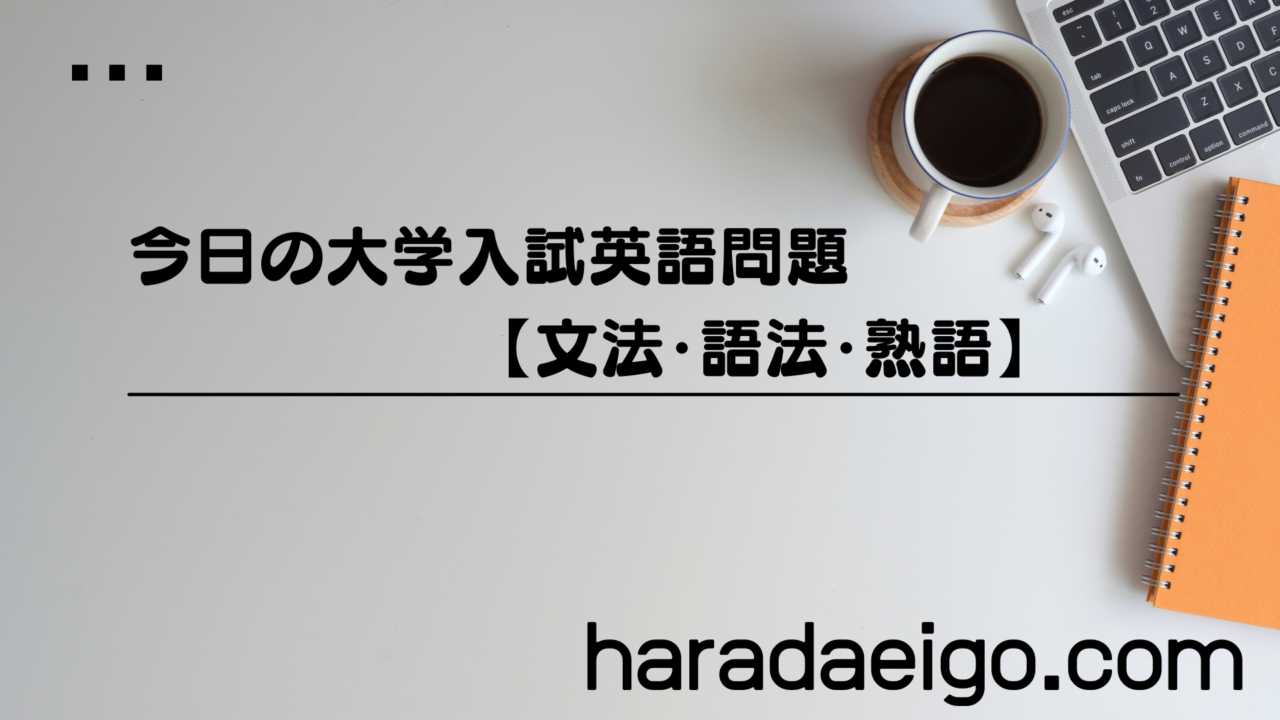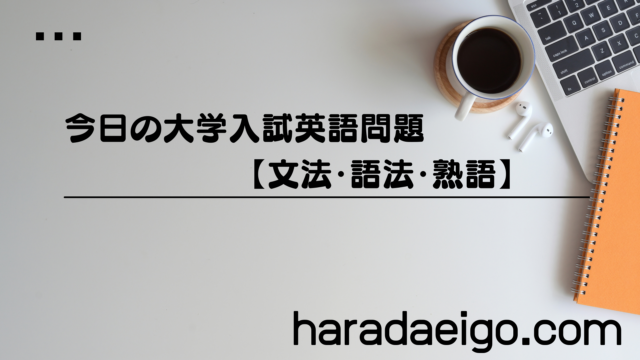問 1 【星薬科大学 (薬) 2024】
Since the deadline is approaching, the graduate student spent hours on end writing her research paper.
1.continuously 2.occasionally 3.simultaneously 4.ultimately
【解答】(1)
【解説】
「締め切りが近づいているため、大学院生は何時間も<on end(連続して)>研究論文を書いていた」という文脈で、on endと同じ意味で置き換えられる語を選ぶ問題です。
【選択肢】
・continuously「連続して、絶え間なく」(on endと同意)
・occasionally「時々、時折」
・simultaneously「同時に」
・ultimately「最終的に」
(1) continuouslyが正解です。on endと同じく「連続して、継続的に」という意味を持ちます。
【和訳】
締め切りが迫っていたため、大学院生は何時間も連続して研究論文を書いていた。
【補足】
“hours on end”は「何時間も続けて」という慣用表現です。
on end/continuouslyの類義語:
☆ constantly
☆ ceaselessly
☆ incessantly
☆ without interruption
これらはいずれも「絶え間なく、連続して」という意味で使用されます。
問2. 【星薬科大学 (薬) 2024】
We can find Mr. Parker in his office more often than not.
1.as long as time allows 2.for a brief period
3.longer than usual 4.most of the time
【解答】(4)
【解説】
「more often than not(たいてい、大抵の場合)」というイディオムを含む文で、この表現と同じ意味で置き換えられる語句を選ぶ問題です。
【選択肢】
・as long as time allows「時間が許す限り」
・for a brief period「短時間」
・longer than usual「いつもより長く」
・most of the time「たいてい、ほとんどの場合」(more often than notと同意)
(4) most of the timeが正解です。more often than notと同じく「大抵の場合、たいてい」という意味を持ちます。
【和訳】
パーカーさんは、たいてい彼のオフィスにいる。
【補足】
“more often than not”は「大抵の場合は」という意味の慣用句です。
more often than not/most of the timeの類義語:
☆ usually
☆ generally
☆ typically
☆ in most cases
これらはいずれも「たいてい、大抵」という頻度を表す表現として使用されます。
問3. 【星薬科大学 (薬) 2024】
The attitude of some new workers towards their colleagues started to get on our nerves.
1.drive us to tears 2.drive us up the wall
3.take us by surprise 4.take us for granted
【解答】(2)
【解説】
「新入社員の同僚に対する態度が私たちの神経を苛立たせ始めた(get on our nerves)」という文脈で、この表現と同じ意味で置き換えられる慣用句を選ぶ問題です。
【選択肢】
・drive us to tears「私たちを泣かせる」
・drive us up the wall「私たちをイライラさせる」(get on our nervesと同意)
・take us by surprise「私たちを驚かせる」
・take us for granted「私たちを当たり前のように思う」
(2) drive us up the wallが正解です。get on our nervesと同じく「イライラさせる、苛立たせる」という意味を持ちます。
【和訳】
一部の新入社員の同僚に対する態度が、私たちをイライラさせ始めた。
【補足】
“get on someone’s nerves”と”drive someone up the wall”はどちらも「人をイライラさせる」という意味の慣用句です。
get on nerves/drive up the wallの類義語:
☆ annoy
☆ irritate
☆ frustrate
☆ make someone crazy
これらはいずれも「イライラさせる、苛立たせる」という意味で使用されます。
問4. 【星薬科大学 (薬) 2023】
Further negotiation between the two parties now seems to be out of the question.
1.absolutely fine 2.fairly possible 3.incredibly patient
4.totally unlikely
【解答】(4)
【解説】
「両者間のさらなる交渉は、今やout of the question(ありえない、不可能)」という文脈で、この表現と同じ意味で置き換えられる語句を選ぶ問題です。
【選択肢】
・absolutely fine「まったく問題ない」
・fairly possible「かなり可能である」
・incredibly patient「信じられないほど忍耐強い」
・totally unlikely「まったくありそうにない」(out of the questionと同意)
(4) totally unlikelyが正解です。out of the questionと同じく「まったくありえない、不可能である」という意味を持ちます。
【和訳】
両者間のさらなる交渉は、今やまったくありえそうにない。
【補足】
“out of the question”は「絶対に不可能である、論外である」という意味の慣用句です。
out of the question/totally unlikelyの類義語:
☆ impossible
☆ unthinkable
☆ not possible
☆ improbable
これらはいずれも「不可能な、ありえない」という意味で使用されます。
また、この表現の反意語として:
・possible
・likely
・probable
などがあります。
問5.【星薬科大学 (薬) 2023】
Our brains are naturally organized to categorize things we encounter in order to put into perspective the complicated world around us.
1.cease action against 2.look up to 3.make sense of 4.take no notice of
【解答】(3)
【解説】
「私たちの脳は、複雑な世界をput into perspective(理解する、正しく捉える)ために、出会うものを自然と分類するように組織化されている」という文脈で、この表現と同じ意味で置き換えられる句動詞を選ぶ問題です。
【選択肢】
・cease action against「~に対する行動を止める」
・look up to「~を尊敬する」
・make sense of「~を理解する」(put into perspectiveと同意)
・take no notice of「~を無視する」
(3) make sense ofが正解です。put into perspectiveと同じく「理解する、意味をなす」という意味を持ちます。
【和訳】
私たちの脳は、私たちを取り巻く複雑な世界を理解するために、遭遇するものを自然と分類するように組織化されている。
【補足】
“put into perspective”と”make sense of”はどちらも「理解する、把握する」という意味の表現です。
put into perspective/make sense ofの類義語:
☆ understand
☆ comprehend
☆ grasp
☆ figure out
これらはいずれも「理解する、把握する」という意味で使用されます。
また、文中の”categorize”(分類する)は、
・classify
・sort
・group
などの類義語があります。
問6.【星薬科大学 (薬) 2023】
The law requires that new medicines go through animal testing before approval.
1.be subject to 2.grant permission to 3.look into 4.put off
【解答】(1)
【解説】
「法律では、新薬は承認前に動物実験をgo through(受ける、経る)ことが要求される」という文脈で、この表現と同じ意味で置き換えられる句動詞を選ぶ問題です。
【選択肢】
・be subject to「~を受ける、~の対象となる」(go throughと同意)
・grant permission to「~に許可を与える」
・look into「~を調査する」
・put off「~を延期する」
(1) be subject toが正解です。go throughと同じく「~を受ける、~を経る」という意味を持ちます。
【和訳】
法律では、新薬は承認前に動物実験を受けることが要求される。
【補足】
“go through”と”be subject to”はどちらも「~を経る、~を受ける」という意味の表現です。
go through/be subject toの類義語:
☆ undergo
☆ experience
☆ be exposed to
☆ be required to take
これらはいずれも「~を受ける、~を経験する」という意味で使用されます。
また、文中の”approval”(承認)は、
・authorization
・permission
・consent
などの類義語があります。
“animal testing”は、より専門的には:
・animal trials
・animal studies
・preclinical studies
とも呼ばれます。
問7.【星薬科大学 (薬) 2023】
Although the student was impatient to go abroad, the study abroad program was suspended due to the COVID-19 pandemic.
1.desired 2.endured 3.hindered 4.obtained
【解答】(1)
【解説】
今回は<was impatient>(待ちきれない、熱望している)という部分の言い換えを考える問題です。
【選択肢】
・desired「望んでいた」(was impatientと同意)
・endured「耐えた」
・hindered「妨げられた」
・obtained「獲得した」
(1) desiredが正解です。was impatientと同じく「強く望んでいた、切望していた」という意味を持ちます。
【和訳】
学生は留学を強く望んでいたが、留学プログラムはCOVID-19のパンデミックのために中断された。
【補足】
“be impatient to do”は「~することを切望している、~するのを待ちきれない」という意味の表現です。
be impatient/desireの類義語:
☆ be eager to
☆ be anxious to
☆ long to
☆ yearn to
これらはいずれも「~を強く望む、切望する」という意味で使用されます。
「熱望」を表す名詞形:
・desire
・eagerness
・enthusiasm
・passion
などがあります。



